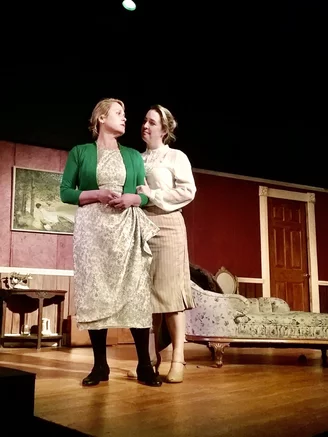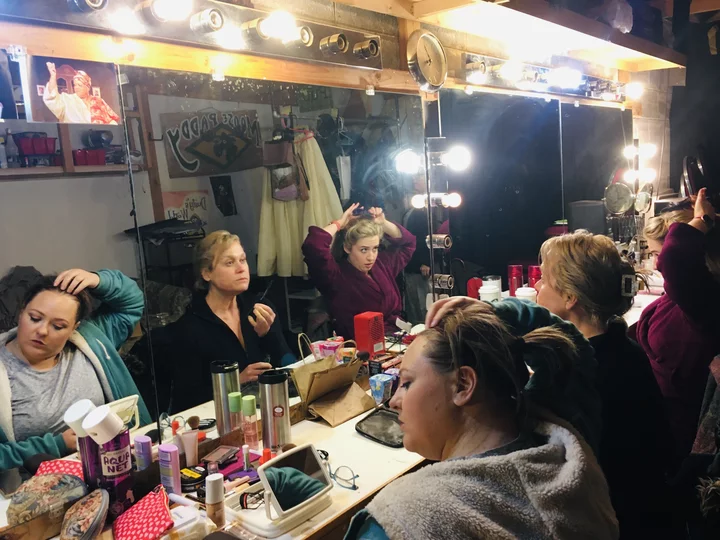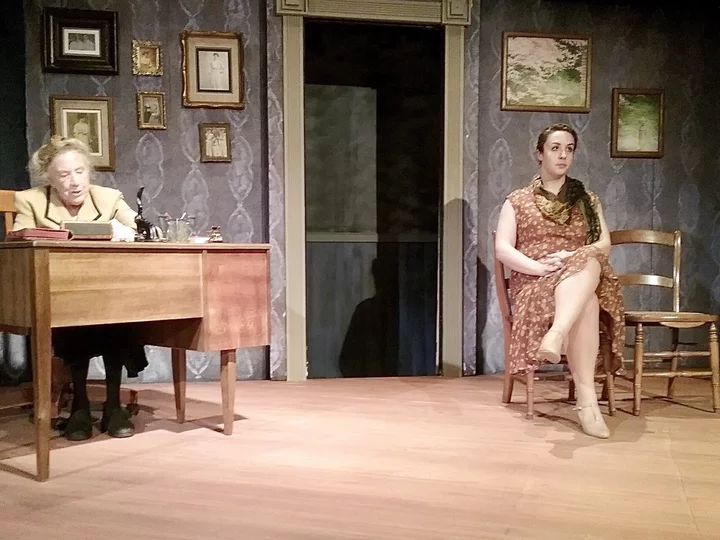The cast of Bull in a China Shop get ready, just before the power went out in the dressing room | Photo: Stephanie McGeary
###
The old theater cliché “the show must go on” never seems more relevant than it is in Humboldt, where the rural location, old theater buildings and unpredictable weather can sometimes cause unwanted surprises during a show. That was exemplified in how relatively calm the cast of Bull in a China Shop at Redwood Curtain Theatre remained when the power went out in the dressing room just before showtime.
“We’re here because we love it so much,” local actor Amelia Resendez, who plays the character Pearl in the play, told the Outpost. “So anything that goes wrong – we just go with it.”
Just minutes after the Outpost sat down with the five-woman cast – Resendez, Natasha White (Mary Woolley), Caroline Needham (Jeannette Marks), Toodie Boll (Dean Welsh) and Sarah Traywick (Felicity) – the dressing room went dark. After a brief moment of shock and confusion about the unexpected blackout, the actors continued to put on their makeup and do their hair by the lights on their cell phones, as the stage manager and theater staff scrambled to get the dressing room lights back on. When it became clear that the issue would not be immediately resolved, the actors continued to talk to the Outpost amid the darkness, cracking jokes about how very “community theater” this moment was.
Luckily, the rest of the theater was unaffected by the power issue (which must have been caused by a blown fuse), and the opening show did go on as planned. One of the immediately striking things about Redwood Curtain Theatre is how different the setup is from most local theaters. The space is small and intimate, with a crescent-shaped stage, giving the audience the ability to see the set from multiple angles. Sitting in the front row at this theater, you are so close to the actors, you could almost reach out and touch them (of course, don’t do that), especially during this show, where the characters sometimes walk offstage, and do several monologues that almost break the fourth wall, treating the audience as if they are students of the university in which the play mostly takes place.
Bull in a China Shop – a somewhat new play, written in 2018 by Bryna Turner – is set between the years 1899 and 1937 and revolves around the relationship between real women, Mary Woolley and Jeannette Marks and is based on the actual love letters sent between the two over the course of their relationship. The play starts around the time that Woolley accepted a job as the president of Mount Holyoke College – a liberal arts women’s college in Massachusetts, where Marks also becomes a professor.
Weaving back and forth through different years, the story touches on many themes – love and relationships, women’s rights, the educational system – as the characters navigate the struggles of the women’s suffrage movement and the onset of World War II. Somehow this relatively short play (about 90 minutes) manages to pack in all of these themes, and do so with a great deal of levity and many laughs, but also many tender moments.

Natasha White (left) and Caroline Needham as lovers Mary Woolley and Jeanette Marks | Photo: Carol Lang
Director Carol Lang said that the length of the play and the unique setup of Redwood Curtain’s stage did present challenges with the show that she, the production team and the cast had to come up with creative solutions for.
“[The story] moves at a really fast pace and goes to so many different locations, and through so many different years,” Lang told the Outpost during a pre-show interview. “So it’s a challenge. Like, how are you going to show all that in 90 minutes?”
One of the ways that Lang and the cast displayed the passage of time was through many costume changes, with different years shown through the fashion of the era. This could not have been an easy feat for the actors, who have to change in a very narrow hallway backstage. Redwood Curtain’s dressing room is separate from the tiny backstage area and requires a trip through the theater’s lobby. So, once the show has begun, the actors can no longer make the trip to the dressing room to change costumes.
Without an actual curtain to draw, there were also few set changes throughout the show. Instead, Lang chose to create the feeling of different locations by projecting images on a screen in the center, back wall of the stage. Lang also included a pre-show slideshow, accompanied by music, that showed real images of the woman in the story, the college and other locations the show is set in, and other historic photos from the women’s suffrage movement.
Though the play is set in the past, it is told using modern language and Lang also chose to leave in some modern elements, including not covering up the actors’ tattoos with makeup. Lang posted a statement in the lobby saying “it is an intentional creative statement that this production chooses to leave all actor’s tattoos uncovered … we felt this symbolizes the future colliding with the past, bringing into focus the roads women have taken to get where we are now and the journey that is still before us.”
In addition to fighting for women’s rights, the characters Woodley and Marks also face the struggles of their relationship, which is riddled with challenges, including infidelity, working together at the same college, not always seeing eye-to-eye on educational and political approaches and sometimes being separated by long distances. Of course, they also face the challenge of being two women living during a time when same-sex relationships were not socially acceptable.
Toodie Boll as Dean Welsh and Needham (Marks) on the stage | Photo: Carol Lang
Local actor Caroline Needham told the Outpost that she can really relate to the Marks character and that she feels it’s really important to share queer love stories on stage, something that we see relatively little of in live theater.
“The themes of this show are really, personally important to me, as a queer woman,” Needham told the Outpost in the dressing room before the show. “My character is a dramatic, queer English teacher, and I’m a dramatic, queer English teacher. … Portraying queer love stories is so important for people to see what it’s like. …With the hate that queer people are experiencing recently, especially in performance around drag, and the continued bigotry that queer people face, it can be really, really empowering to see [queer love stories] on stage.”
White also appreciates being able to show a love story between two women, and feels that this play does an excellent job of showing the struggles that occur within Woolley and Marks’ relationship, without it being the sole focus of the play.
“Our [character’s] obstacles are with the passion of what we’re trying to do politically,” White told the Outpost. “And, you know, we have relationship problems here and there. But it isn’t stereotypical or one-dimensional. We’re just two people in love. I think [the play] is beautifully written that way.”
With the show’s themes, it seems fitting that all the characters are women and with a small cast of only five performers, the actors said that they really got a chance to dive deep into their characters and the history of the period the play is set in. Of course, it also gave them a chance to become very close with each other.
“I love working with a small, tight cast,” Needham told the Outpost. “It’s so much easier to do in-depth work. We can all really rely on each other a lot and we got to know each other really well, which is really important in a play that demands a lot of intimacy.”
The bond that the participants form when working together for months on a show seems to be the draw for many people who participate in local theater – the directors, the lighting and sound crew, the designers and the actors. These folks receive little to no pay and have to work through sometimes challenging circumstances, like having to get ready in a dressing room with no power. But the joy that comes with creating a show and sharing it with the community seems to be enough to keep them coming back.
“I think it is an amazing creative outlet for so many people because it’s community-oriented,” Lang told the Outpost. “Anybody can audition for a show. Anybody can sign up to usher or run the lightboard..it’s an amazing coming together of like-minded people who believe in the creative arts. And you meet lifetime friends. You meet people that you would never have met before. And you might not even mingle with them outside the theater, but you all become this family.”
Bull in a China Shop will continue its run at Redwood Curtain Theatre – 220 1st St, Eureka – through Mar. 11. You can purchase tickets at this link.
And, in case you were wondering, the dressing room power did eventually get turned back on. So, at least for now, the actors are no longer getting ready in the dark.


CLICK TO MANAGE